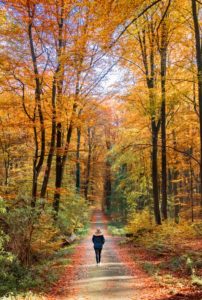Nature &
Your Mental Health
There is something very restorative about being amongst nature. Whether it’s a walk through the woods or by the sea, smelling the fresh forest air and listening to the crunching of leaves under your feet or maybe sitting and watching the sun rise, nature has a way of making us feel good and boosting our overall well being. There are so many other ways we can enjoy nature.
Below we explore some tips and suggestions for you to try.
1.Grow or pick your own food
- Create a growing space. If you don’t have access to a garden, you could plant salad leaves or herbs in a window box or plant pot.
- Go fruit picking. Look for local farms or orchards that let you pick fruit to buy. You might also find fruit growing in urban spaces, for example wild blackberries.
2.Bring nature inside
- Treat yourself to your favourite flowers or potted plants for your home.
- Collect natural materials, for example leaves, flowers, feathers, tree bark or seeds – use them to decorate your living space or in art projects.
- Arrange a comfortable space to sit, for example by a window where you can look out over a view of trees or the sky.
- Take photos of your favourite places in nature. Use them as backgrounds on a mobile phone or computer screen, or print and put them up on your walls.
- Listen to natural sounds, like recordings or apps that play birdsong, ocean waves or rainfall.
3. Do activities outdoors
- Take a walk in green space, such as a local park.
- Get creative. Draw or paint animals or nature scenes, or let them inspire a poem or song lyrics. If you enjoy writing in a journal, try doing this outside.
- Eat meals outdoors. Have a picnic in a local park, or simply sit in a garden.
- Watch the stars. Use a stargazing website, app or book to help you recognise different stars, or simply enjoy looking at the night sky. Give your eyes time to adjust, as it can take about 20 minutes before you can fully see stars in the dark.
- Try exercising outside. Run or jog through a local park, or try a local outside exercise class.
- Go beachcombing. Visit the seaside and search the shoreline for interesting things.
4. Connect with animals
- Hang a bird feeder outside a window. If there’s space, you could build a small wooden nesting box on a tree or under a windowsill. Try our bird feeder activity here.
- Try pet-sitting or dog walking. Offer to be a pet sitter in your local neighbourhood, volunteer to walk dogs for an animal shelter, or ask to borrow a friend’s dog for occasional evening or weekend walks.
- Visit a local community or city farm. You might be able to help out by volunteering. Many farms have a small encounters session where you can hold and stroke the small animals and maybe even help feed them.
- Watch out for wildlife. If you don’t live near open countryside, try visiting a local park to look for squirrels, fish, insects, ducks and other birds.
5. Help the environment
- Go on a litter picking walk, for example, in the park or on the beach.
- Plant helpful seeds, such as berry bushes for garden birds or flowers to help bumblebees.
- Build an animal habitat, for example, build a hedgehog house or create a pond if you have enough space.

Download our tips in a printable format:
You may also find the following online resources helpful:
